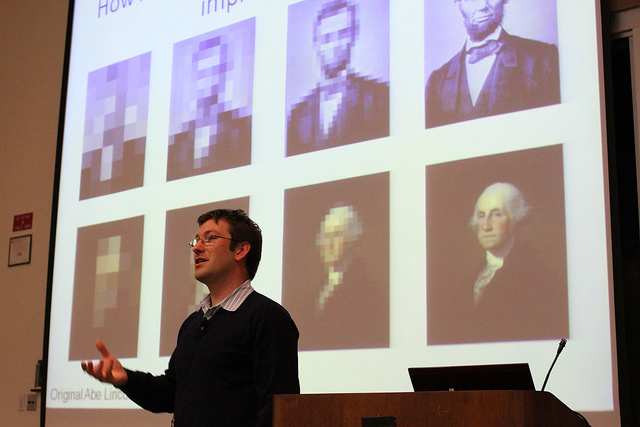Faculty Spotlight: Matt Goupell
April 22, 2015
Maryland Language Science Center

How do listeners use their two ears to better understand speech in noisy environments, or to locate the source of a sound in the space around them? How are these processes different for people with two cochlear implants rather than normal hearing? These are just some of the questions that occupy Matt Goupell , Assistant Professor in Hearing and Speech Sciences and director of the Auditory Perception and Modeling Lab . Matt earned his PhD in Physics from Michigan State in 2005, and then spent time as a postdoc at the Academy of Sciences in Vienna, Austria and the University of Wisconsin, Madison before coming to UMD in 2011. Matt’s lab conducts studies with unilateral and bilateral implantees as well as using “vocoded speech” with normal-hearing listeners to simulate the experience of listening with cochlear implants. Want to know what speech might sound like with a cochlear implant? You can listen to an example of noise-vocoded speech here Cochlear Implants (CIs) have been revolutionary for people with profound hearing impairment - but the acoustic information obtained through CIs is quite different from normal hearing, and there are still many open questions about how CI users listen to and process language. Answers to these questions have huge potential impacts on treatment and on future implant technology, as well as on our understanding of how adults and children with normal hearing make use of acoustic information. Two CIs are better than one A major focus of Matt’s research has been on understanding how people with bilateral cochlear implants use their ears together for locating sounds in space and understanding speech in the presence of background noise. This research can help to improve treatment procedures (such as how implants are programmed or “mapped”), as well as impacting decision making about when bilateral implants are the best option. Matt’s work in this area involves collaborations with researchers at Walter Reed National Military Medical Center and the University of Wisconsin, Madison, and numerous publications on their findings and the clinical implications. His research accomplishments won him the R. Bruce Lindsay Award from the Acoustical Society of America in 2014 for his substantial contributions to the fields of theoretical and applied acoustics. Age-related impacts on CI users Even if they don’t have any hearing loss, older adults commonly experience a decline in ability to process rapid temporal information and this leads to more difficulty understanding speech. CI users have the added challenge of lacking some acoustic information available to normal listeners, and so age-related changes may be particularly detrimental. In collaboration with Sandra Gordon-Salant, Samira Anderson , Miranda Cleary and graduate student Maureen Shader, Matt is investigating the effect of changes in temporal processing in older adults with cochlear implants. Language development and language processing for CI users A new project with Rochelle Newman and Yi Ting Huang focuses on language processing in adults and children with cochlear implants. According to Matt, “most cochlear-implant research measures percentage of correct words… The field of cochlear implants seems less interested in how cochlear-implant users process and use language. Since they are receiving less acoustic information, they have to work harder to understand what is going on in a sentence, and likely would have to use more context and cognitive resources.” Children born deaf who receive cochlear implants (CIs) early in life seem to have relatively little difficulty developing language: if you meet someone who received a CI at 12 months of age, you might not notice that they have a hearing problem. But since the input they receive from the implant is missing some information available to normal-hearing listeners, they may be processing language differently. To investigate this, the group is conducting a series of eye-tracking studies which compare children and adult CI-users with normal-hearing controls. And now for something completely different If you want to catch Matt outside the lab or the classroom, you might find him …. on the Frisbee field. A former competitive Ultimate Frisbee player, he captained a team that made it to Nationals three years in a row and ranked as high as 9th in the country. He says he hasn’t played much Frisbee since coming to Maryland - but now that his secret is out, we are hoping for a champion Language Science Frisbee team to add to the sporting accomplishments of our Semantic Valueball players and relay-running PsychoLinguists.



